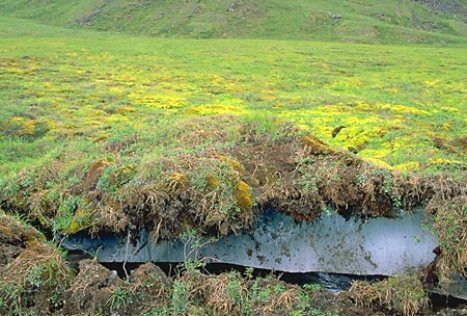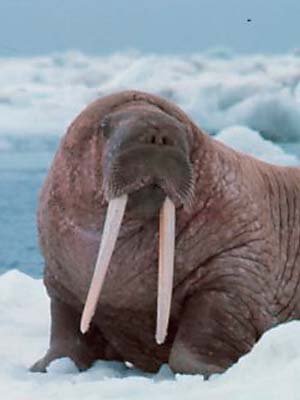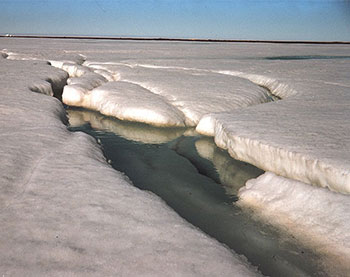|
|
|
|
|
|
|
|
Today's Congressional Action:
The Senate is expected to consider non-Arctic legislation. The House is not in session.
|
 Scientists in Alaska Race to Understand Thawing Permafrost. Until recently, climate models, which predict everything from sea level rise to temperature increase, have largely ignored or glossed over permafrost, one of the largest stores of carbon on the planet. That's because data on the temperature of permafrost and the thickness of the active layer of soil that lies above the frozen ground were neither centralized nor available in a format modelers use. That's about to change. Alaska Dispatch News Scientists in Alaska Race to Understand Thawing Permafrost. Until recently, climate models, which predict everything from sea level rise to temperature increase, have largely ignored or glossed over permafrost, one of the largest stores of carbon on the planet. That's because data on the temperature of permafrost and the thickness of the active layer of soil that lies above the frozen ground were neither centralized nor available in a format modelers use. That's about to change. Alaska Dispatch News
Western Arctic Caribou Migration Returns to Traditional Route Past Northwest Villages. With caribou herds in decline and migration patterns swaying in recent years, news that caribou are following a more traditional migration route near the villages of Kivalina and Noatak caused a buzz in Northwest Alaska this fall as hunters scrambled to put meat in their freezers for the winter. But recent action near the Red Dog Mine has caused frustration among some hunters from the Kivalina area. The 52-mile Red Dog Mine road connects the mine to its port 17 miles south of Kivalina. Village hunters have taken to accessing the mine road from the beach and using it to hunt from. But the mine road is a private industrial road, not public, and Red Dog Mine officials in conjunction with NANA closed the road Sept. 3. Alaska Dispatch News
 Walrus Meat Near Sanikiluaq Test Post for Trichinella. Nunavut's department of health is warning residents of Sanikiluaq that a walrus caught near the community has tested positive for trichinella. The Government of Nunavut said the animal, harvested Sept. 8, tested positive for the parasite that causes trichinosis. In a Sept. 18 release, health officials encouraged anyone in the Hudson Bay community of 800 who have recently eaten uncooked walrus to note any adverse reactions, and report those to the local health center. The health department has not indicated is anyone in the community has fallen ill from eating walrus meat. Nunatsiaq Online Walrus Meat Near Sanikiluaq Test Post for Trichinella. Nunavut's department of health is warning residents of Sanikiluaq that a walrus caught near the community has tested positive for trichinella. The Government of Nunavut said the animal, harvested Sept. 8, tested positive for the parasite that causes trichinosis. In a Sept. 18 release, health officials encouraged anyone in the Hudson Bay community of 800 who have recently eaten uncooked walrus to note any adverse reactions, and report those to the local health center. The health department has not indicated is anyone in the community has fallen ill from eating walrus meat. Nunatsiaq Online
Scientist Calculate the Dramatic Economic Cost of a Warming Arctic. The Arctic is one of the most vulnerable parts of the world when it comes to climate change, and has the potential to contribute some costly climate-related effects, such as sea-level rise from melting glaciers. But one of the biggest emerging talking points in conversations about climate change in the Arctic involves something else - permafrost. This frozen soil typically contains large amounts of carbon-containing organic matter. That's fine as long as the soil stays frozen - but as the Arctic continues to heat up year after year, more and more permafrost is starting to thaw, unleashing its stored carbon into the atmosphere in the process in the form of both methane and carbon dioxide, mostly the latter. Altogether, scientists estimate that Arctic permafrost could contain 1,700 gigatons (which is equal to 1.7 trillion tons) of carbon. Washington Post
 Melting Arctic Sea Ice Accelerates Methane Emissions. Methane emissions from Arctic tundra increase when sea ice melts, according to a new study from Lund University in Sweden. This connection has been suspected before, but has lacked strong evidence until now. "Changes in the Arctic Ocean can affect ecosystems located far away on land, " says Dr. Frans-Jan Parmentier, the study's lead author and researcher at the Department of Physical Geography and Ecosystem Science, Lund University. Bright sea ice reflects most sunlight, while open water absorbs most sunlight. Less sea ice, therefore, leads to more absorbed heat, and higher temperatures throughout the North Pole region. This stimulates the production of methane by microorganisms in permafrost soils, which also drives the change towards a warmer climate. Phys.Org Melting Arctic Sea Ice Accelerates Methane Emissions. Methane emissions from Arctic tundra increase when sea ice melts, according to a new study from Lund University in Sweden. This connection has been suspected before, but has lacked strong evidence until now. "Changes in the Arctic Ocean can affect ecosystems located far away on land, " says Dr. Frans-Jan Parmentier, the study's lead author and researcher at the Department of Physical Geography and Ecosystem Science, Lund University. Bright sea ice reflects most sunlight, while open water absorbs most sunlight. Less sea ice, therefore, leads to more absorbed heat, and higher temperatures throughout the North Pole region. This stimulates the production of methane by microorganisms in permafrost soils, which also drives the change towards a warmer climate. Phys.Org
Researchers Study How Warm, Subsurface Water Affects Accelerated Arctic Sea-ice Melt. Scientists aboard the Arctic Research Vessel Sikuliaq say it appears sea ice in the far north has retreated as far as it's going to this season. That's based on satellite data - and, this year, eyewitness accounts. "Right now," says Chief Scientist Jennifer MacKinnon, "I'm standing on the bridge as we're approaching the remnants of the ice pack. A lot of which has already melted, this summer, but we're approaching one of the larger chunks of it that's still in this area." KUAC
Traditional Knowledge Research Reference Released. The Wildlife Management Advisory Council recently released the Traditional Knowledge Research Reference Guide. In addition to traditional knowledge the guide includes information on use and occupancy or traditional use studies. A link to the reference is here.
|
|
Legislative Action
No Arctic legislation was formally considered Friday.
|
|
Future Events
Eighth Polar Law Symposium Alaska 2015, September 23-26, 2015 (Fairbanks and Anchorage, Alaska , USA). The Eighth Polar Law Symposium is co-hosted by Alaska Pacific University (APU), the University of Alaska Fairbanks, the University of Alaska Anchorage (through its Justice Center and its Institute of Social and Economic Research), the University of Washington School of Law, and Vermont Law School, in cooperation with the Arctic Law Section of the Alaska Bar Association. The symposium will be held on both campuses of the University of Alaska. The 2015 theme is: The Science, Scholarship, and Practice of Polar Law: Strengthening Arctic Peoples and Places.
2015 Arctic Energy Summit, September 28-30, 2015 (Fairbanks, Alaska, USA). The Institute of the North's 2015 Arctic Energy Summit builds on our legacy efforts to address energy as a fundamental element of the sustainable development of the Arctic as a lasting frontier.Central to this concept is a focus on providing pathways for affordable energy development in the Arctic and for Arctic communities.
The Arctic Circle is the largest global gathering on the Arctic. It is attended by heads of state and governments, ministers, members of parliament, officials, experts, scientists, entrepreneurs, business leaders, indigenous representatives, environmentalists, students, activists, and others from the growing international community of partners and participants interested in the future of the Arctic. The Arctic Circle highlights issues and concerns, programs, policies and projects; it provides platforms for dynamic dialogue and constructive cooperation. While the plenary sessions are the responsibility of the Arctic Circle, the breakout sessions are organized by various participating partners in their own name and with full authority over the agenda and the choice of speakers.
2015 Arctic Science Conference, October 1-3, 2015 (Anchorage, Alaska, USA). The conference theme is "Healthy Estuaries: Sustainability and Resilience." Conference topics include traditional scientific disciplines, science education, arctic social sciences, biomedical research, and artistic interpretation of the evolving North. Abstract submissions are now being accepted. The deadline is August 1, 2015.
The Polar Oceans and Global Climate Change, November 3-6, 2015 (La Jolla, California USA). The American Polar Society will host this Symposium at Scripps Institution of Oceanography. A flyer with a partial list of presenters is available on the Society's website (americanpolar.org) and from the Society's Membership Chairman by email.
Forum for Arctic Modeling and Observational Synthesis Meeting, November 3-6, 2015 (Cape Cod, MA, USA). On November 3rd, the 2015 School for young scientists will consider "Regional Oceanography of the Arctic marginal seas" with lectures covering major features of atmospheric, sea ice and oceanographic regimes of the: Bering, Chukchi, Beaufort, East-Siberian, Laptev Sea, Kara, Barents and Nordic seas. On November 4-6, the meeting portion will summarize project accomplishments for the last 3 years of activities and will focus on the formulation of scientific questions and directions for FAMOS future research (2016-2019) to: (a) improve Arctic modeling, employing very high resolution models; (b) develop and test new arctic monitoring/observing systems and (c) improve predictions of Arctic environmental parameters with reduced uncertainties.
Due North: Next Generation Arctic Research & Leadership, November 5-8, 2015 (Calgary, Alberta, Canada). The Association of Canadian Universities for Northern Studies (ACUNS) will convene an interdisciplinary conference of early career scientists working on Arctic issues. Topics will include: Arctic Communities, Arctic Sustainable Development, Arctic Wildlife, Ecosystem and Biodiversity, Arctic Food Security, Arctic Landscapes, Climate Change and Adaptation, Disaster Risk Management, Policy, Politics and Leadership, Arctic Environment (Data and Techniques), Arctic Resources, and Future of Arctic.
Matchpoints Seminar, November 12-13, 2015 (Aarhus, Denmark). The purpose of the conference is to provide a forum for policy-makers and academics to deliberate on how the security, resilience and sustainability of the globalized Arctic region and its peoples may be enhanced, and what instruments of governance may most suitably contribute. The conference will spell out (1) how the different relevant dimensions of security (military, economic, environmental, energy and human security) manifest themselves in the governing / governance arrangements in the Arctic; (2) how the challenges associated with each manifest themselves, individually and together; and (3) what forms of governing arrangements can best help to address the challenges. The conference will also focus on (4) how the Nordic countries and nations, including Greenland, the Faroe Islands and Aaland Islands, may contribute to the peace, stability and prosperity of the Arctic region through collaborative efforts based on their shared social, human, environmental and democratic values.
Arctic Observing Open Science Meeting, November 17-19, 2015 (Seattle, Washington). The Arctic Observing Open Science Meeting will be 2.5 days and held at the Hyatt at Olive 8 in Seattle, Washington. The conference will bring together individuals and teams involved in the collection, processing, analysis, and use of observations in the Arctic - from academia, agencies, industry, and other organizations. The meeting will be convened as a combination of plenary talks, parallel science sessions, and a poster session. The agenda and registration information will be forthcoming.
In the Spirit of the Rovaniemi Process 2015, November 24-26, 2015 (Rovaniemi, Lapland, Finland).When the Arctic Environmental Protection Strategy, the so-called Rovaniemi Process, was adopted in 1991, it aimed at overcoming divisions and turning the zone of Cold War military tensions into a region of peace and co-operation. In this joint effort focusing on the protection of environment, and later, sustainable development, the Arctic states supported by indigenous organizations laid grounds for institutionalized collaboration and the emergence of Arctic regional identity. The second international conference will bring together decision-makers, scholars, artists, designers and students to address these questions and discuss the Arctic in global, regional and local perspectives.
Arctic Encounter Paris (AEP 2015), December 11-12, 2015 (Paris, France) (During the UN Convention on Climate Change - COP21). The Arctic Encounter Paris will take place at the French Senate at Luxembourg Palace and the French Military College, École Militaire, in Paris, France, on the final days of the monumental United Nations Convention on Climate Change (COP21) where thousands of global citizens and government delegates will be gathered to deliberate the world's response to our changing planet in Paris. The AEP is the only Arctic policy side event currently planned to take place during the UN Convention. A reception will take place following the closing panel.
3rd Annual Arctic Encounter Symposium (AES 2016), January 15-16, 2016 (Seattle, WA, USA). Building upon the preceding Arctic Encounter event in Paris, the third annual Arctic Encounter Symposium (AES) in Seattle, Washington will convene policymakers, industry leaders, and leading experts to confront the leading issues in Arctic policy, innovation, and development. As the largest annual Arctic policy event in the United States, the AES mission is to raise awareness, engage challenges, and develop solutions for the future of a region and a people. The two-day program includes two keynote luncheons, expert plenary sessions, break out sessions, a networking cocktail reception and seated dinner at the Museum of History and Industry on South Lake Union. A closing reception will take place at the conclusion of the program. The official host of the third annual AES is the University of Washington School of Law.
|
|

  
4350 N. Fairfax Drive, Suite 510
Arlington, VA 22203, USA
External links in this publication, and on the USARC's World Wide Web site ( www.arctic.gov) do not constitute endorsement by the US Arctic Research Commission of external Web sites or the information, products or services contained therein. For other than authorized activities, the USARC does not exercise any editorial control over the information you may find at these locations. These links are provided consistent with the stated purpose of this newsletter and the USARC Web site.
|
|
|
|
|
|
|
|
|